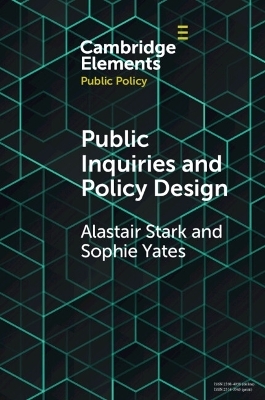
Public Inquiries and Policy Design
Seiten
2024
Cambridge University Press (Verlag)
978-1-009-28689-3 (ISBN)
Cambridge University Press (Verlag)
978-1-009-28689-3 (ISBN)
This Element addresses the gap in policy design literature that has largely ignored the important ways that public inquiries can act as policy design tools, meaning the functions that inquiries can offer the policy designer are not properly understood.
Public inquiries regularly produce outcomes of importance to policy design. However, the policy design literature has largely ignored the many important ways that public inquiries can act as policy design tools, meaning the functions that inquiries can offer the policy designer are not properly understood. This Element addresses this gap in two ways. First, it presents a theoretical discussion, underpinned by international empirical illustrations, to explain how inquiries perform policy design roles and can be classified as procedural policy tools. It focuses on four inquiry functions – catalytic, learning, processual, and legitimation. Second, it addresses the challenge of designing inquiries that have the policy-facing capacities required to make them effective. It introduces plurality as a key variable influencing effectiveness, demonstrating its relevance to internal inquiry operations, the external inquiry environment, and policy tool selection. Thus, it combines conceptual and practical insights to speak to academic and practice orientated audiences.
Public inquiries regularly produce outcomes of importance to policy design. However, the policy design literature has largely ignored the many important ways that public inquiries can act as policy design tools, meaning the functions that inquiries can offer the policy designer are not properly understood. This Element addresses this gap in two ways. First, it presents a theoretical discussion, underpinned by international empirical illustrations, to explain how inquiries perform policy design roles and can be classified as procedural policy tools. It focuses on four inquiry functions – catalytic, learning, processual, and legitimation. Second, it addresses the challenge of designing inquiries that have the policy-facing capacities required to make them effective. It introduces plurality as a key variable influencing effectiveness, demonstrating its relevance to internal inquiry operations, the external inquiry environment, and policy tool selection. Thus, it combines conceptual and practical insights to speak to academic and practice orientated audiences.
1. The public inquiry: an idiosyncratic institution; 2. Theorizing inquiries as policy tools; 3. What can inquiries offer the policy designer?; 4. Designing effective inquiries; 5. Conclusion; References.
| Erscheinungsdatum | 14.05.2024 |
|---|---|
| Reihe/Serie | Elements in Public Policy |
| Zusatzinfo | Worked examples or Exercises |
| Verlagsort | Cambridge |
| Sprache | englisch |
| Themenwelt | Sozialwissenschaften ► Politik / Verwaltung ► Politische Theorie |
| Sozialwissenschaften ► Politik / Verwaltung ► Staat / Verwaltung | |
| ISBN-10 | 1-009-28689-7 / 1009286897 |
| ISBN-13 | 978-1-009-28689-3 / 9781009286893 |
| Zustand | Neuware |
| Haben Sie eine Frage zum Produkt? |
Mehr entdecken
aus dem Bereich
aus dem Bereich
Der »progressive« Angriff auf Israel, Judentum und …
Buch | Softcover (2024)
edition TIAMAT (Verlag)
CHF 39,20
ein Vortrag
Buch | Softcover (2024)
Suhrkamp (Verlag)
CHF 13,95
Aufgaben, Arbeitsweisen, Anforderungen
Buch | Softcover (2024)
Kohlhammer (Verlag)
CHF 39,20


